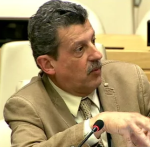Social Watch E-Newsletter - Issue 309 - August 18, 2017
Published on Fri, 2017-08-18 00:00
 |
| Issue 309 - August 18, 2017 |
|
|
Social Watch reports
Spotlight report on the 2030 Agenda
|
|
|
| |
|
| |
Armenia: End of transition? Nationalization of the SDGs
|
| |
|
| |

Photo: Agaron Adibekyan (Sociometr)
|
The Armenian government seeks to liberalize socioeconomic and political activities in a framework of respect for human rights and gender equality, acknowledges the national Social Watch report. Over the past 15 years, the poverty rate has fallen from 51 percent to 26.5 percent, but the unemployment rate is unchanged, which remains one of the main factors driving labor migration: almost one in four families (23%) in Armenia has members outside the country, of which 20 percent are in Russia and 3 percent in Europe. The analysis of the Center for Development of Civil society concludes that despite a certain increase in per capita income, the current level allows families to cover only the costs of food and some utilities, since the state's minimum wage and various allowances do not take into account needs for medical care, education, vacation time or cultural activities. Read more
|
| |
|
| |
|
| |
Peru: History of crimes against people and the environment
|
| |
|
| |
In the first four months of 2017, severe floods isolated hundreds of Peruvian towns, leaving thousands of families homeless and destroying over 100 bridges. The waters have swept away bridges and roads. The Amazon, Marañón, Ucayali and Napo rivers, in the Amazon region, are under red alert because owing to a critical level of flow and danger of overflow. According to the World Bank, damage to the environment has an economic cost of 3.9 percent of gross domestic product (GDP), and mainly affects the poorest populations. In spite of te high vulnerability to human-made natural disasters, the national Social Watch report finds tenacious resistance to more sustainable practices by those who argue that environmental regulation is an obstacle to economic growth and corporate profits. Read more
|
| |
|
| |
Social Watch starts publishing country reports 2017
Social Watch coalitions around the world are contributing their assessments and reports to the global Social Watch report 2017 on the national implementation of the 2030 Agenda in its first year. Stalled, or slipping back, is the theme that appears in many of the contributions. Natural and un-natural disasters, some of them of catastrophic proportions, appear again and again not just as an obstacle to faster progress towards the agreed goals, but in fact setting the clock back. Part of the reason for lack of progress has to do with an over–reliance on public-private partnerships, urged by the World Bank as a way to finance implementation of the SDGs.
The Social Watch national platforms are independent coalitions of civil society organizations struggling for social and gender justice in their own countries. The Social Watch network has been publishing since 1996 yearly reports on how governments implement their international commitments to eradicate poverty and achieve equality between women and men.
|
| |
|
| |
|
| |
|
| |
Reflections on the 2017 United Nations High-Level Political Forum on Sustainable Development. In his opening remarks, the UN Secretary-General said that 20 years ago “there was the idea that globalization would not only increase global wealth, but that it would trickle-down and would benefit everybody in our planet”.
He went on to describe that at the present time, “globalization and technological progress have dramatically increased global trade and global wealth. It is true that the number of absoute poor has been reduced and that living conditions have improved all over the world but it is also true that globalization and technological progress together have been factors in the increase of inequality”. Read more
|
|
| |
|
| |
|
| |

Photo: UN Web TV
|
“The caring duties of women are fulfilled too often without any pay or recognition and when paid, the work of those that care for the people we most love such as our children and parents barely deserves a minimum salary and most often than not without any form of contract or the formal protection of social security", said Roberto Bissio, coordinator of Social Watch, speaking on behalf of the Global Coalition for Social Protection Floors (GCSPF) in the side event: “Global Partnership on Universal Social Protection: Ending Poverty by 2030” held during the HLPF.
We need more resources, yes. We need to collect taxes and to build capacity, but we also need a change in paradigm, towards a caring system that orients and coordinates the programs of education, health and social development, starting with a recognition of the right to be cared and the duties of the state in that regard.” See the video here
|
|
| |
|
|
|
| |
|
SOCIAL WATCH IS AN INTERNATIONAL NGO WATCHDOG NETWORK MONITORING POVERTY ERADICATION AND GENDER EQUALITY Social Watch >>
Social Watch E-Newsletter For comments, sugestions, collaborations contact us at: socwatch@socialwatch.orgTo stop receiving this newsletter send a message with the subject "unsubscribe" to: socwatch@socialwatch.org |
|
|
|
|
